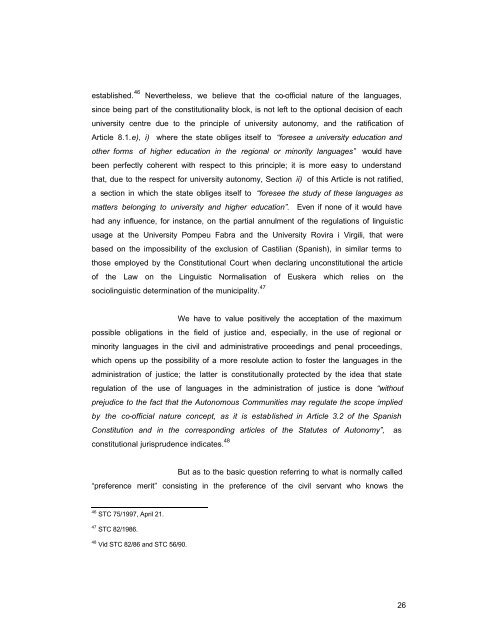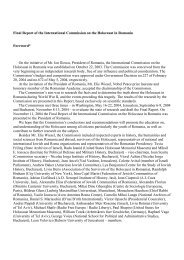get PDF document - MIRIS
get PDF document - MIRIS
get PDF document - MIRIS
Create successful ePaper yourself
Turn your PDF publications into a flip-book with our unique Google optimized e-Paper software.
established. 46 Nevertheless, we believe that the co-official nature of the languages,<br />
since being part of the constitutionality block, is not left to the optional decision of each<br />
university centre due to the principle of university autonomy, and the ratification of<br />
Article 8.1.e), i) where the state obliges itself to “foresee a university education and<br />
other forms of higher education in the regional or minority languages” would have<br />
been perfectly coherent with respect to this principle; it is more easy to understand<br />
that, due to the respect for university autonomy, Section ii) of this Article is not ratified,<br />
a section in which the state obliges itself to “foresee the study of these languages as<br />
matters belonging to university and higher education”. Even if none of it would have<br />
had any influence, for instance, on the partial annulment of the regulations of linguistic<br />
usage at the University Pompeu Fabra and the University Rovira i Virgili, that were<br />
based on the impossibility of the exclusion of Castilian (Spanish), in similar terms to<br />
those employed by the Constitutional Court when declaring unconstitutional the article<br />
of the Law on the Linguistic Normalisation of Euskera which relies on the<br />
sociolinguistic determination of the municipality. 47<br />
We have to value positively the acceptation of the maximum<br />
possible obligations in the field of justice and, especially, in the use of regional or<br />
minority languages in the civil and administrative proceedings and penal proceedings,<br />
which opens up the possibility of a more resolute action to foster the languages in the<br />
administration of justice; the latter is constitutionally protected by the idea that state<br />
regulation of the use of languages in the administration of justice is done “without<br />
prejudice to the fact that the Autonomous Communities may regulate the scope implied<br />
by the co-official nature concept, as it is established in Article 3.2 of the Spanish<br />
Constitution and in the corresponding articles of the Statutes of Autonomy”, as<br />
constitutional jurisprudence indicates. 48<br />
But as to the basic question referring to what is normally called<br />
“preference merit” consisting in the preference of the civil servant who knows the<br />
46 STC 75/1997, April 21.<br />
47 STC 82/1986.<br />
48 Vid STC 82/86 and STC 56/90.<br />
26












